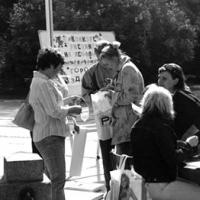A script is a practical game for professional librarians. Training seminar “Promotion of library services (Brand technologies in libraries). Classification of business games
WHAT is it easy and boring to work in the library ???
WHAT do librarians read all day ???
WHAT only grandmothers work in the library ???
WHAT and HOW MUCH a LIBRARY should know and be able to?
WHY is learning becoming a lifelong learning experience for librarians?
WHAT ARE "PROS" and "CONS" in planning the training of librarians today?
HOW and WHAT should modern librarians be trained?
HOW and WHERE do you start planning?
HOW to write competently the Plan of professional development of librarians?
WHAT innovative forms of education are replacing traditional ones?
HOW TO BE SUCCESSFUL IN TEACHING?
2016: "What is the coming year for us?"
 We tried to answer these questions at the webinar, which was held on September 9 for specialists from the municipal libraries of the Pskov region. He consulted A.L. Levchenko, head. the sector of continuing education of the department for coordinating the activities of libraries of the region of the Pskov OUNL.
We tried to answer these questions at the webinar, which was held on September 9 for specialists from the municipal libraries of the Pskov region. He consulted A.L. Levchenko, head. the sector of continuing education of the department for coordinating the activities of libraries of the region of the Pskov OUNL.
In your professional training and self-education you will be helped ...
INTERNET RESOURCES:
Site "Interregional Library Cooperation Center" - http://www.mcbs.ru
Library Leadership School website - http://biblider.ru(project of the NF "Pushkin Library")
Informational support portal for heads of cultural institutions - http://www.cultmanager.ru/magazine/archive/92/2294/
The website of the Russian Library Association - http://www.rba.ru/
"Competent librarian" (presentation) - http://www.myshared.ru/slide/264333/
 RESOURCES of the Pskov Regional Universal Scientific Library:
RESOURCES of the Pskov Regional Universal Scientific Library:
Site of the Pskov OUNB - Section "COLLEAGUES" - www.pskovlib.ru;
Blog "Methodical service of POUNB" - http://metodistam.blogspot.ru;
- "Library portal of the Pskov region" - Section "Continuing education" - ;
Section "Methodical steering wheel" - on the site "Pskov Regional Library for Children and Youth named after V.A. Kaverina "- http://kaverin.ru;
Section "Helping Professionals" - on the site "Pskov Regional Special Library for the Blind and Visually Impaired" - http://pskov-sbs.ru.
METHODOLOGICAL BOOKS (PUNB):
PROFESSIONAL PUBLICATIONS:
Vetchanova, O. V. Advanced training of cultural workers // Directory of the head of a cultural institution. - 2012. - No. 7. - S. 56-63.
Golovko, S. I. Specialist: Education, competence, innovation. - M.: 2005.
Zbarovskaya, N. V. Business games for library specialists. - M.: 2005.
Sample programs of city (district) seminars for librarians. - Krasnoyarsk, 2003.
Sukiasyan, E.R. Library profession. Frames. Continuing education. - M.: FAIR - PRESS, 2004.
Sukiasyan, E.R. Library Profession and Personnel Management. - SPb. : 2011.
REMEMBERDEAR COLLEAGUES!
“TO TEACH ANOTHER,
MORE SMART IS REQUIRED THAN TO LEARN YOURSELF. "
Michelle Montaigne
"LEARNING, WE LEARN BY OURSELVES"!
training scenario. Travel.
This scenario was used by me as a psychological training for adolescents (Council of high school students MBOU "Yarskaya secondary school No. 1") for the preventive work of quarrels and conflicts in this group. The training was conducted in the form of a separate lesson, in which the necessary stages are presented -warm-up, main part, reflection and discussion.
Goals ׃ Prevention of quarrels and conflict situations in the group.
Tasks:
rallying the group;
assistance in the development of empathy and self-awareness;
the formation of skills for joint activities;
development of skills to "feel the group" and its individual members;
development of skills for providing and receiving feedback.
Band size
: 12 people.
Resources:
a spacious room free of unnecessary furniture, light chairs according to the number of participants, bandages (for half of the participants), a Whatman sheet, a pack of felt-tip pens for each, a technical device for playing music, audio recording with relaxation music (Bella’
sLullaby,
RobPattinson), cards (according to the number of participants) with the names of participants written on them, mats, sweets.
Time: at least two hours.
PROGRESS OF THE GAME
In front of the entrance to the auditorium, there are 3 boxes of different colors: yellow, red and black. At the entrance, each training participant puts a token in a box of the color they like.
(Yellow means joy, red means excitement, black means grief).
Stage 1 - physical warming up.
Leading: Good evening guys. I will ask you to stand in a circle at a free distance from each other and repeat after me the movements and phrases that I will now show.
Exercise "Granny from Brazil"
Leading : ( Standing straight, keeping your hands at the seams, cheerfully): "I have a grandmother in Brazil!"
Leading : ( Repeat position 1, then put your right leg forward, turning the foot inward): "She has such a leg!"
Leading : ( Repeat positions 1 and 2, then rotate the body so that the left (right) shoulder moves forward, and put the elbow of the left (right) hand forward, hiding the hand under the armpit ): "She has such a hand!"
Leading : ( Repeat positions 1, 2 and 3, then tilt your head over your shoulder and curl your mouth) : "Her head is on one side and her mouth is crooked!"
(Repeat positions 1, 2, 3 and 4, then, bouncing in the resulting pose, loudly) : “She jumps and shouts:“ I am the most beautiful grandmother in Brazil !!!
Exercise "Luggage rack"
Leading: Now, let's imagine that the long-awaited summer vacation has finally arrived. You went on vacation to your grandfather's village, far away, in the wilderness of the forest, away from the bustle of the city and noisy street crowds. You had to go there by train. Here you enter the carriage, find your compartment and find that only the upper luggage rack is free of things. You need to put your large and heavy travel bag on top. But first, imagine this bag of yours as vividly as possible. Here she stands in front of you. What color is it? What shape? Feel its weight: it is quite impressive, but you can still cope with the task. You are strong and agile enough to throw your luggage upstairs. Prepared. We put our feet shoulder-width apart! They "took" the load. Raise it up ... Do you feel the tension in your hands? Back muscles work? The shelf is high. You have to get up on your toes to push the bag up to the sa my walls. One more effort and ... a bag on the shelf! Ooh! Now you can completely relax, sink into a chair. Squeeze and unclench your fingers several times, rotate with your hands.
Exercise Spaghetti
Leading : Good. But the road is long. It would be nice to have a snack for now. Imagine pouring boiling water over instant noodles. But it's not just noodles- this is real spaghetti! Long, thin pasta is on the plate in front of you. Let's grab one of them with our fingers. It hangs freely, swinging from side to side. If we begin to rotate with our hand, then our imaginary pasta will begin to wriggle like a string or rope. Try to hook the spaghetti with a fork. Screw them onto the plug. Catch the pasta with your mouth. Now turn into spaghetti yourself. Relax, chat your hands, feel like a real macaroni ...
Stage 2 - immersion in the game situation.
Leading: Now your train has arrived at the long-awaited station. But the road to grandfather's house is still far away. Yesterday on the train it was interesting and fun for you. You were together -and no adults. But the day that had come turned out to be completely different from the previous one. It was dull and gray. It was sad and bad. You began to grumble at each other and quarrel for no reason. Conflicts flared up from scratch like sparklers, but unlike them, they did not burn out quickly. Nobody could understand what was the matter. And before you there was a choice, what to do? Is it worth the risk and go on a dangerous journey or stay here, but at the same time continue to quarrel and conflict. What do you choose?
(If the group members choose to travel (which they usually do), then the next stage of work begins.)
Stage 3 - overcoming obstacles.
Exercise "Enchanted Forest"
(A route is drawn on the floor with chalk or marked with a rope. Along this route, several chairs are laid one after another in a chain. It turns out a winding path three to five meters long.)
Leading:
You have entered the forest. But he was bewitched. Why is he considered bewitched? Because there are areas in it, entering into which a person ceases to see. If you manage to bypass such a section of the road, then your vision returns. Such areas are visible from the side. Therefore, you can help each other to cope with this task. You will have to overcome enchanted places in pairs. One in a pair will be the master, and the second will be the slave. The slave is blindfolded. His task is to follow the route and not to get lost, not to leave the path. The leader will give him instructions in words: left, right, two steps forward, and the like. Of course, he cannot approach the follower, touch him with his hands and somehow, apart from words, direct the actions of his partner. When the follower overcomes the obstacle, he himself becomes the leader and helps his partner to follow the path.
(Participants are paired)
Are you confident in your abilities? In the reliability of partners? Has it ever happened to you that in a state of tension you lost control of yourself and forgot the simplest things: for example, where is the right and where is the left? Do not confuse these directions while walking through the enchanted section of the forest. Before we start moving, it is important to remember the following: the leader is fully responsible for the follower. He must clearly and timely warn him about all possible dangers and obstacles. And second: dear viewers, the success of the passage depends on you. Maintain silence so as not to interfere with contact between partners walking along the enchanted path. Observe how each pair organizes the transition, what are the differences in the actions of the participants.
(The facilitator ties a blindfold over the eyes of one of the members of the first pair, and the game begins. When all the pairs have overcome the enchanted section of the path, a discussion of this exercise begins.)
Leading:
How did you feel while walking the trail blindfolded?
What turned out to be more difficult for you - walking the trail or leading a partner's actions?
What did the audience see?
Who has memorized and can demonstrate typical body language as a player passes through the enchanted area?
What is the difference between the behavior of a person who is deprived of the opportunity to see the world around him?
Exercise "The Abyss"
Leading: Now I will ask you to go to the stairs. Stand on the steps and position yourself between both the railing and the drawn line.
(take the starting position)
Leading: I must warn you that now you are high in the mountains where serious dangers await you. The line that you see in front of you- it is not just a line, it is the border of a narrow path. A deep abyss opened behind her, falling into which leaves no hope of staying alive. At my signal, you turn into bizarre rock blocks hanging over the path in the most unexpected way. Spread your legs, stretch your arms, bend down ... Only the participant on the far left becomes a climber. His task- walk along the abyss along its entire length, without falling into it. The climber can overcome the path in any way: squeeze into narrow crevices between rocks, look for niches, crawl, clinging to the "stones" ...- do not harm or hurt anyone. As soon as the first climber has passed part of the path, the participant following him can turn from a rock block into a man and begin his dangerous journey. The one who reached the end of the difficult path turns to stone himself. It is important that all of you overcome this obstacle and safely pass the dangerous section of the route.
(When everyone in the group has passed the chasm, you can discuss the feelings they had during the exercise.)
Exercise "Swamp"
Leading: As soon as you, dashing travelers, managed to cross the hard-to-reach mountains, a new attack arose. On the way, you came across a swampy swamp. It is possible to pass it only along rare bumps. And you can't stumble, otherwise you can easily drown in the quagmire. You will now begin your journey through the swamp. Be very careful! Help each other move from bump to bump. Support your comrades so that they do not fall into the swamp. After all you go together and everyone you have the right to count on the help of companions. Any jolts, rudeness towards comrades, intemperance, haste and ill-considered actions can lead each of the participants and the group as a whole to a sad result. And vice versa: mutual understanding, responsibility, under Keeping friends together will ensure success.
( Chairs (according to the number of participants) are placed in a circle close to each other. Invite the participants to take off their shoes and climb onto chairs)
Leading : You start moving at my command. You will move from chair to chair clockwise. The first stage will end when you return to the chair from which you started the movement. Forward!
(After the group members have mastered by this task)
Leading : Well done! But your way the swamp is not finished yet. I AM I suggest you stand by two on one chair (remove 3 vacant chairs from the circle).
(The group begins to move again in more difficult circumstances. On successful completion
this stage
pull out
circle
three more
chair.
Again, there is movement along rare "bumps". The crossing over the swamp is considered complete, and the task is completed when all
the participants
are located on
three
player in one chair
and, if they succeeded, supporting each other, to withstand
chairs,
until the leader counts to ten.
)
Stage 4 - co-creation.
Exercise "Evening get-togethers "
Leading : You have already covered most of the way. However, the journeynot completed yet. Frontyou spread outbig lake, onthe other side of which is the hut.But evening comes and you decidepostpone the crossinguntil morning. After all, you still need build a raft - other watercraft you have not and is not expected. You lit up bonfire, cooked dinner, had a snack. I don't feel like sleeping yet. You are pleased to sitby the fire, chat with friends, just to have fun.In the evenings with special pleasure listen to all sorts of interesting stories . Therefore, I invite you to write your own story. But do this is it will be necessary in an unusual way. our historywill be created jointly. Somebodyof you will begin the story. First the narrator will pronounce a few phrases, then I clap hands, and the continuation of the story will have to come up with his neighbor to the left . Then the right of the story passed on to the next etc. But! Second storytellermust pronounce text in a special language - "jibrish". Cotton- third party goes back to history and continues story in Russian. Fourth speaks jibri againshe ". The fifth returnsto the story and so on. In other words, every odd player tells a fabulous history, each the even one "picks up" her on the "jibrish".
But what is jibrish? This is imaginarylanguage. A kind of gibberish, gibberish. Of course, "jibrish" can be given a resemblance to some really existing language- French, English, German. As, for example, in the famous pseudo-Italian song of characters film "Formula of love": "Uno, uno, uno, un momento! .. " leave the language no national features, and limit ourselves to exclusively emotional coloring of speech, enhancing the story with facial expressions and gesticulation. If everyone understands, let's start!
The exercise "Dream our groups "
Leading : However, the time is already late. We need to rest before tomorrow's crossing of the lake. Tired travelerssettle down to rest and fall asleep.And they all have dreams. Close your eyes and imagine what you would like to see dream...
(turn on soft relaxation music)
Leading : Conjure up a picture- the image of your dream ... You have wonderful dreams! Imagine that your dreams are hovering over you, intertwining with each other, and a new image appears.- common dream of our group ...
(put a large sheet of Whatman paper in the center of the circle and around it - felt-tip pens. Music continues to play throughout the exercise)
Leading : Open your eyes ... Now we will depict a collective dream that we had on this magical night. During the execution of the task, you must not talk in any case! Otherwise, we will frighten off our dreams, and we will not succeed. Now you will silently pick up the felt-tip pens and start drawing your dream. In doing so, pay attention to what your comrades are portraying. Your task- to create an image of our group's collective dream. This means that you need to try to "build" your image into the system of other images so that you get a single, integral picture. I remind you once again that everything must be done only in silence. Please get started!
Stage 5 - completion of the journey.
Exercise "Raft"
Leading: Morning has come. Working together, you built a raft from tree trunks and lowered it into the water. True, only young trees with thin trunks grew nearby, so the raft, although it was strong enough, could tilt dangerously and even turn over if the load was unevenly placed.
(offer participants to sit on the "raft" taking into account some instability of the raft. Remind that it is dangerous to shift its center of gravity)
Leading: So, you went sailing on the lake. The weather was favorable, the lake was calm, and you hoped the journey would be easy. But when you reached the middle of the lake, out of nowhere a huge eagle appeared, for some reason very interested in your craft. The eagle, having made a leisurely circle over you, sank on the edge of your raft, at once disturbing the unstable balance ...
(stay up to this moment outside the boundaries of the "raft", stand on the edge of the raft).
Leading: To you it is urgent to regroup so that the raft does not overturn!
Once you have changed your seats taking into account the weight of the unexpected "passenger", as the eagle took off again and moved to the other end of the raft.
(quickly change your location; repeating this procedure two or three more times, report that the eagle has flown away, and leave the "raft")
Leading
: Here, at last, is the shore. Our journey is drawing to a close. You can already see the hut where grandfather lives. You were so looking forward to this meeting, so you wanted to ask your grandfather for advice, what to do, how to live on in joy, without quarrels and conflicts. Approaching the hut, you go up the porch and knock on the locked door..
The door opens by itself and you go inside. There, sitting at a large wooden table, grandfather is waiting for you. You tell him about your trouble.
- "What do you want from me?"- asks the grandfather.
- “Only you can help us! Do it! "
- "No, - says grandfather.- You are wrong. I AM I can't help you. "
- "Why?": - you ask. You certainly did not expect such a turn.
- "That's why, - says grandfather,- that only you can help yourself. You have almost done it, having traveled a long and difficult path and overcome many obstacles. After all, you almost did not quarrel and supported each other.I can only prompt what you need to do. But for this you have to complete three tasks. "
The exercise "V starring each other "
Leading: Each of you should portray one of your comrades in such a way that everyone else will recognize him. You need to portray without the use of words, only with the help of facial expressions, gestures, pantomime. There are three attempts for each guess. If you accidentally get a card with your name, it's okay.
(Participants pull out pre-prepared cards from the stack, on which the names of all members of the group are written)
Exercise "Metaphor"
Leading: The next task is as follows. Again you have to pull out at random one of the cards with the name of one of the guys in our group. But now we need to come up with some kind of metaphor that help Let the rest of you guess whose card you got. Lines from a song, a vivid image, maybe some kind of association associated with this person can act as a metaphor. For example, you can offer the following metaphor: “When I think about this person, I imagine an old oriental jug with a gold ornament, in which ordinary water seems tasty and sweet ...” Or: “Knowing the hobbies of this person, I immediately remember the summer, a river, early morning and a float diving into the water ... "
The exercise "Gifts for Friends"
Leading: This is the last task. The third time, you will have to pull out a card with a name. But now you no longer need to guess the person. And if you come across a card with your own name, you can openly exchange with someone. I want to invite you to make gifts to each other. Imagine that you are magicians and capable of fulfilling any human desire. Look at your partner, guess what he is dreaming of. What gift would he like to receive? If you guess correctly and he will be happy with the gift that you give him, then you have come to an understanding and conflicts between you will no longer arise.
Stage 6 - farewell ritual.
The exercise. I give this to you as a sign ...
(Prepare "gifts" (sweets). "Gifts" are placed in a beautiful vase, which stands on a ritually decorated table in the center of the hall.)
Leading : I invite everyone to take a handful of "gifts" and approach another with the words: "I bring you this gift as a token of my gratitude for ..."
Everyone ends a sentence depending on the relationship that developed during the training: "For understanding, love, recognition, help, etc." (During the recitation, the gift is offered to be eaten)
Leading: And now I ask you forthank each other for playing together and do this exercise. You need to hug as many of your comrades as possible in 15 seconds.
Stage 7 - discussion of the training
(prepare cards for each of the participants)
Leading: Each of you received question cards. I will give you an answer to them.
What moments of the game did you like the most? Why?
Which of the tasks was the most difficult? Why?
Did you feel the support and help of your comrades during the game?
Did you learn something new about the band members?
Did you manage to avoid manifestations of rudeness, aggression, conflicts during the game?
Is it possible in life to do without quarrels and insults?
Host: I ask you to put tokens in the boxes according to your mood. The training is over, and the life to which our training was devoted is ahead. Thanks to all!
Communication skills are one of the main professional functions of a librarian. We can not always say about ourselves that we are successfully implementing it. Therefore, it is always useful for us to meet with psychologists - specialists in human understanding.
And how often do meetings happen in the world of libraries with representatives of related professions who understand well the essence, features and problems of our profession? The employees of the Central Library System were lucky: on Thursday, April 19, a journalist, teacher, PR specialist Svetlana Vyacheslavovna Novatorova visited us.
Seminar-training - this is how you can designate the format of the meeting. The most interesting thing is not that Svetlana Vyacheslavovna convinced us that every librarian is a speaker and speechwriter, i.e. a public person who knows how to compose and deliver speeches. We guessed about it ourselves. It is interesting that she convinced us of this, using our "family", for a long time familiar to us "stumbling blocks."
 How to conduct a conversation if in the library a person behaves inappropriately, simply arrogantly, or, on the contrary, hesitates in confusion, not knowing himself what he needs? And how to tell about yourself, your library or book, so that a person drops everything and runs to the library? How to deny a visitor something without offending him? But how to convince a person who claims that he does not want to read and that no one needs reading?
How to conduct a conversation if in the library a person behaves inappropriately, simply arrogantly, or, on the contrary, hesitates in confusion, not knowing himself what he needs? And how to tell about yourself, your library or book, so that a person drops everything and runs to the library? How to deny a visitor something without offending him? But how to convince a person who claims that he does not want to read and that no one needs reading?
 Practical tasks, training exercises offered by Svetlana Vyacheslavovna led me to the idea that answers to all these questions can be found in world and domestic classical and modern literature. Take any literary plot, and you will see that it is based on the psychological incompatibility of the characters, non-observance of the laws of successful communication. Simply put, the inability to communicate with each other, a lack of understanding of who the hero is, who is his interlocutor, what are their goals and mutual expectations. I am not ready to bear responsibility for the entire world and domestic classical and modern literature, but I would venture to assert that all of it rests on the fact that psychologists do not work well. I apologize to psychologists and communication technology specialists, but this phrase is just a practical embodiment of the advice of the psychologists themselves that it is best to start a message and communication with some unusual phrase that immediately stops attention. From a phrase that sometimes comes from the opposite, but makes the interlocutor interested, focus on what is being said to him.
Practical tasks, training exercises offered by Svetlana Vyacheslavovna led me to the idea that answers to all these questions can be found in world and domestic classical and modern literature. Take any literary plot, and you will see that it is based on the psychological incompatibility of the characters, non-observance of the laws of successful communication. Simply put, the inability to communicate with each other, a lack of understanding of who the hero is, who is his interlocutor, what are their goals and mutual expectations. I am not ready to bear responsibility for the entire world and domestic classical and modern literature, but I would venture to assert that all of it rests on the fact that psychologists do not work well. I apologize to psychologists and communication technology specialists, but this phrase is just a practical embodiment of the advice of the psychologists themselves that it is best to start a message and communication with some unusual phrase that immediately stops attention. From a phrase that sometimes comes from the opposite, but makes the interlocutor interested, focus on what is being said to him.
To acquire these skills, you just need to read a lot and meet more often with such professional psychologists as S.V. Novatorova.
Ch. methodologist of the Central Regional Hospital named after F.M. Dostoevsky
Galina Palgueva
- Add a comment
Comments (1)
Wed, 2012-04-25 12:11 -
World, domestic, classical and modern literature cannot "hold on to" whether psychologists work well or badly. The author's statement on this topic is devoid of elementary logic and common sense.
Wed, 2012-04-25 21:10 -
Literature always "rests on what takes place, what exists in our beautiful and" insane, insane world. " And this is precisely the area of interest of psychology. A good writer is always a good psychologist. In turn, a professional psychologist can take a literary situation, the relationship of literary characters as a visual aid for correcting real (everyday) psychological situations. For a long time there have been such terms as "reading psychology", "bibliotherapy", and behind them, of course, there is real work. "Elementary logic and common sense" is an excellent thing ... for a textbook of mathematics, physics, a textbook on business, etc. In the human soul, in psychology and fiction, not everything is so "elementary straightforward" And if you approach the article under discussion with a little sense of humor, you can imagine a picture ... So "Lady Macbeth from the Mtsensk district" came to a psychologist (psychotherapist). .. he ligically explained to her how to act so that the passion of love does not deprive the lady of her mind ... She listened to all this, took to the leadership, did not kill anyone ... Okay? Of course good!!! But ... humanity would not have received the Leskovsky masterpiece. "All happy families are alike. All unhappy ones are unhappy in their own way" - this is the first line of "Anna Karenina". It's good when all unhappy families come to a psychologist and he will explain everything to them and everyone will be happy ... equally. And it will be boring, and there will be no L.N. Tolstoy and magnificent works of art. Probably, this comment is also devoid of common sense and logic ... but .. so what has grown, it has grown. But there is no logically straightforward boringness.
The course "Promotion of library services (Brand technologies in the library)" was prepared in 2009. and is a logical continuation of the course "Innovative forms of library services". The course is aimed at studying the basics of branding technologies and the possibilities of their application in library practice, at instilling the skills of promoting library services / products / services in a cultural environment, at identifying the tools necessary to carry out branding tasks.
The subject of the course is determined by the tasks of promoting new library services and services, creating a favorable image of the organization in the eyes of the local community, improving interaction with society, and enhancing the creative component in the activities of libraries.
Sections topics:
Topic 1. Creation of your own brand.
Topic 2. Stages of brand positioning.
Topic 3. Marketing components of the brand.
Topic 4. Features of brand promotion (range of services / products / services) in libraries.
Training format: training.
Seminar participants receive a handout package for additional training.
 Interaction of the library with cultural institutions
Interaction of the library with cultural institutions Training seminar "Promotion of library services (Brand technologies in libraries)
Training seminar "Promotion of library services (Brand technologies in libraries) National library of latvia or castle of light
National library of latvia or castle of light Beautiful wishes for a good morning and a nice day
Beautiful wishes for a good morning and a nice day Trial sport Trial sport
Trial sport Trial sport How to fire a school principal
How to fire a school principal How to make a basket of vines with your own hands: the easiest way (MK)
How to make a basket of vines with your own hands: the easiest way (MK)